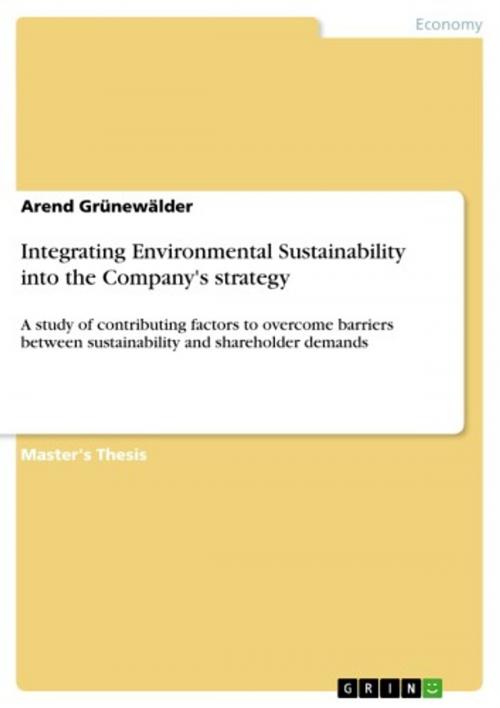Integrating Environmental Sustainability into the Company's strategy
A study of contributing factors to overcome barriers between sustainability and shareholder demands
Business & Finance, Business Reference, Business Ethics| Author: | Arend Grünewälder | ISBN: | 9783640296651 |
| Publisher: | GRIN Publishing | Publication: | March 25, 2009 |
| Imprint: | GRIN Publishing | Language: | English |
| Author: | Arend Grünewälder |
| ISBN: | 9783640296651 |
| Publisher: | GRIN Publishing |
| Publication: | March 25, 2009 |
| Imprint: | GRIN Publishing |
| Language: | English |
Master's Thesis from the year 2009 in the subject Business economics - Business Ethics, Corporate Ethics, grade: 1,3, University of Applied Sciences Essen, 120 entries in the bibliography, language: English, abstract: The findings of this research are most useful for those (e.g. executives, environmental managers) who view environmental sustainability as a vital issue for business and intend to develop a corporate strategy that responds to stakeholder's expectations while ensuring long-term performance. The aim of this research is to verify that shareholder is exactly the right focus for pursuing an environmental related strategy, and that key stakeholders are expecting firms are taking ownership on environmental issues. Central to the research question are identified barriers preventing companies from pursuing an environmental strategy. According to various surveys among executives, they regard environmental issues as strategically important, however relatively few companies appear to be translating the importance they place on these constraints into corporate action. The methodology of this study is to test hypotheses during an explanatory case study. Before testing the hypotheses, a descriptive literature research provides basic information, describing the topic as well as common practices and results from empiric studies. Then a case study serves as a research strategy to collect and analyze data for testing the constructed hypotheses. It explains the relationship between variables within the arguments which are environmental initiatives and the financial performance, reporting standards and effectiveness of communication to stakeholders, and meeting stakeholder's expectations with corporate practices. The findings from the second research phase, the real-life case study, are basically supporting the findings from the literature research. By expressing eco-efficient practices in financial terms, a significant impact to the estimated cash flow and return rate (ROI) generated by opportunity benefits was identified. Various practices were discovered to prove that smart companies focusing on the right accounting and reporting tools seize competitive advantage through strategic management of environmental challenges.
Master's Thesis from the year 2009 in the subject Business economics - Business Ethics, Corporate Ethics, grade: 1,3, University of Applied Sciences Essen, 120 entries in the bibliography, language: English, abstract: The findings of this research are most useful for those (e.g. executives, environmental managers) who view environmental sustainability as a vital issue for business and intend to develop a corporate strategy that responds to stakeholder's expectations while ensuring long-term performance. The aim of this research is to verify that shareholder is exactly the right focus for pursuing an environmental related strategy, and that key stakeholders are expecting firms are taking ownership on environmental issues. Central to the research question are identified barriers preventing companies from pursuing an environmental strategy. According to various surveys among executives, they regard environmental issues as strategically important, however relatively few companies appear to be translating the importance they place on these constraints into corporate action. The methodology of this study is to test hypotheses during an explanatory case study. Before testing the hypotheses, a descriptive literature research provides basic information, describing the topic as well as common practices and results from empiric studies. Then a case study serves as a research strategy to collect and analyze data for testing the constructed hypotheses. It explains the relationship between variables within the arguments which are environmental initiatives and the financial performance, reporting standards and effectiveness of communication to stakeholders, and meeting stakeholder's expectations with corporate practices. The findings from the second research phase, the real-life case study, are basically supporting the findings from the literature research. By expressing eco-efficient practices in financial terms, a significant impact to the estimated cash flow and return rate (ROI) generated by opportunity benefits was identified. Various practices were discovered to prove that smart companies focusing on the right accounting and reporting tools seize competitive advantage through strategic management of environmental challenges.















